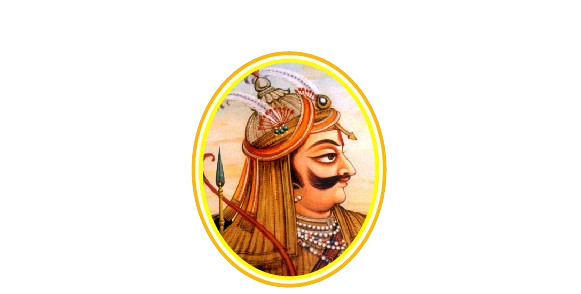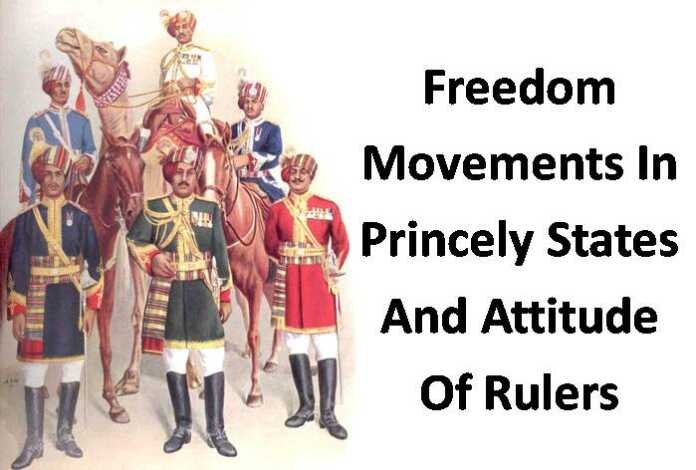Freedom Movements in princely states and attitude of rulers towards it is a very interesting and very disgusting era of Indian history.
The rise, development and growth of popular movement and representative institutions in the princely States of Rajputana or Rajasthan from 1920 onwards is very interesting. It was the product of action and interaction of the numerous historical factors and forces that developed inside the country after the First Word War.
The present paper is intended not to analyze the factors that contributed to the rise and growth of freedom movements, but to portray the general attitude of the Princes towards the freedom movement.
The freedom movement in Rajputana States gathered momentum after 1936 or so. as a result of the impact of the forces of Second World War, the policy of the Congress towards the States, and the struggle carried on by All-India States’ Peoples’ Conference, the subject of princely States were drawn closer into the orbit of the nationalist movement.
The pace of State life was slow. at the dawn of an era of revolutionary nationalism, the State were far behind the rest of India. Some wise British Administrators were conscious of the situation prevalent in the States and foresaw the inevitable effects of growing estrangement between the Rulers and the people. One viceroy after another warned the Princes that their States should be well-governed, as early as1899. Lord Curzon in a speech delivered at Gwalior[1] on 29 November openly said:-
“He (the Prince) must learn that his revenues are not secured to him for his own selfish gratification, but for the good of his subjects; that his internal administration is only exempt from correction in proportion as it is honest; and that his gadi is not intended to be div an of indulgence, but the stern se at of duty.
“His figure should not merely be known on the polo-ground, are on the race-course, or in the European hotel. These may be his relaxations, and I do not say that they are not legitimate relaxations; but his real work, his princely duty, lies among his own people. By this standard shall I, at any rate, judge him. By this test will he in long run, as a political institution, perish or survive.”
Again, in a circular letter issued on 24August, 1900, W. J. Cunningham reminded the princes of their duty and went on to say:
“The Government of India hold very strongly to the opinion that the first and paramount duty of a Native Prince or Chief lies towards his own state and people.
By the protection and authority of the Supreme Government, he is guaranteed a security of tenure in his exalted station superior to that enjoyed by rulers in any other country in the world, and one which is openly sacrificed or impaired by gross misconduct on his part or by some other offence of exceptional gravity.
In return for these advantages the government are entitled to claim that the ruler shall devote his best energies not to the pursuit of pleasure, not to the cultivation of absentee interests or amusements, but to the we lf are of his own subjects and administration.
such a standard of duty is incompatible with frequent absences from the State, even though these may be represented as inspired by the pursuit of knowledge or by a thirst for civilization.
In proportion as a Chief becomes infected with these tastes and inclinations, so in many cases is he apt to be drawn further away from, instead of nearer to, his people.” [2]
The tendency could further be seen in an address to the annual session of the Ch Amber of Prince in New Delhi, by Lord Linlithgow, on March 13, 1939, when he said:
“It goes without saying that an effective machinery by which the authorities of the States can satisfy themselves that all such complaints can readily reach the c are of the Durbar is an essential necessity in the present conditions; and Your Highnesses will all agree with me that it is equally essential that the peoples of the States should feel assured that their wants, their difficulties and their representations will receive the fullest attention and the fullest sympathy.” [3]
These were undoubtedly very laudable sentiments, but little was done by the Princes to translate them into practice.
The net result was the rise of political movements in the princely States. Praja Mandal agitations developed rapidly in Rajasthan after 1935. The All-India States’ Peoples’ Conference, which integrated most of these organizations, also broadened its base and enhanced its activities.
The program of Praja Mandals included demand for civil liberties, representative institutions, improvement of the conditions of the peasantry, abolition of the forced labour and removal of State monopolies. Leaders of the Indian National Congress like Ghandi and Nehru took great and even active interest in the movements of the people of the States and their organizations.
The people’s organisations like Praja Mandals and Parishads in Jaipur, Jodhpur, Alwar, Bharatpur, etc. became in due course of time A real headache for the Rulers, The Rulers adopted the policy of ‘kicks and Kisses.’
Maharaja of Jodhpur in his speech (April, 1940) characterised the Lok Parishad agitation “ As a groundless political agitation”, and warned that “I am not prepared to allow an open campaign of subversive agitation manifestly designed to encourage our peasantry to revolt and corrupt our youth.” [4]
Denouncing the activities of the Parishad, His Highness remarked, “the Lok Parishad consists mainly of inexperienced youngman, who do not appear to have achieved much success in their various vocations.” [5] and this Parishad by the method of vote “dreams to create a new heaven and A new earth.” [6]
Even prior to this in 1938, Sir Donald Field, Chief Minister of Jodhpur, had conveyed the same idea to P. Sitarammayya, President of the All-India States Peoples Conference, when he wrote: “They (Parishad leaders) have no constructive criticisms to make, no well-defined objective, schemes or plans to work, for the betterment of the people. They are mostly Actuated by personal motives and have struck me as possessing neither a clear conception of their responsibilities nor of their rights.”[7]
While discussing the problem of Rajputana States, at a meeting of the Chamber of Princes in the opening months of 1939 at Bombay, Maharaja Ganga Singh of Bikaner, advised the Princes to adopt the policy which he pursued with regard to his own State, Bikaner. He started that he discriminated between the agitator from outside and from amongst his own subjects.
This, he said, was important and the distinction must ever be borne in mind. No consideration should be shown to foreign agitators, because they has no stake in the state. He added.
“There (foreign agitators) continued activities area menace to the State: Their presence constitutes a danger. The remedy is deportation from the State and their entry should be banned.
The agitators in the State, though equally obnoxious to the State and its ordered peace and progress, however, stand on a slightly different footing. They have an interest in the land; they probably sometimes advocate grievances which are to a certain extent legitimate, and such should be redressed as for as possible so that the wind may be taken away from the sails of their agitation which they advocate and foster.
Legitimate grievances so far as possible should be redressed and agitation should be silenced. If the agitators are genuine and come from the ranks of the educated unemployed, an effort should be made to give them suit able state employment and to close their mouths, acting on the adage, “it is better to sew the mouth with a morsel.”
Maharaja of Bikaner was emphatic in his policy and declared: “Be just, but be firm; follow the policy of repression and reconciliation as stated in the famous letter of Lord Minto in 1908: the policy of “kicks and kisses.” He advised the princes to crush and ban Praja Mandals, for which no hard and fast rules could be laid down. Individual States could devise and evolve their own plans and lay down the modus operandi. This, in brief, was the attitude of the Princes towards Praja Mandal Agitations.
Praja Mandals also gained strength in the States because the Princes had lost the quality of leadership and ignored the will of the people. This fact was brought to light in a letter dated April 4, 1947 from B. L. Mitter, Chief Minister of Baroda to Maharaja Sadul Singh of Bikaner.
The letter stated: “Since I come to Baroda, two years ago, the realization has come upon me that if our Rulers led, there would be no Praja Mandal or other disrupting elements. The devotion and allegiance of the Indian subject to the Ruling dynasty are assets of incalculable value. The failure of the Rulers to utilize these Assets is the root cause of unrest in the States. It gives a handle to the unscrupulous politician to usurp the place which should be occupied by the Ruler.”[8]
Endorsing the above viewpoint, Maharaja of Bikaner, wrote on 10th April; “I entirely agree with everything that you say, and particularly that, if the Rulers really led their people in the way they should, there would be very little, if Any, political agitation by disruptive forces in our States. The loyalty, devotion and allegiance of our people towards us are indeed assets of incalculable value, and it is true that it is our failure to utilize these assets which is the root cause of most of the unrest in the States.”[9]
If this realisation had downed on the rulers earlier and had they granted responsible government to the people and themselves contended with the position of titular headship, then, the events might have taken a different course.[10]
By gradually giving their subjects a share in the government of the States, the Princes could have expected them to share their Anxieties also. They failed to remember that their ultimate security depended upon the loyalty in the hearts of the people whom they ruled.
It was only by an intelligent realization of the truths of history and by an active co-operation of their subjects that the Princes could have considerably prolonged, if not perpetuate, their existence in the very teeth of antagonistic forces.
The words of H. H. Sir Sayajirao of Baroda at the round t able conference were prophetic in this connection: “In their (people) prosperity will be our strength in their contentment our security in their gratitude our best reward.” The Princes ignored this prophecy.
REFERENCES
[1] Lord Curzon in India, A selection from His Speeches, 1898-1905, ed. W. Raleigh, pp. 217-18.
[2] Supplement, Gazette of India,August 25. 1900. pp. 1954-6. Cuningham was Secretary to the Government of India in the Foreign Department, 1894-1901.
[3] Mitra: op., cit. the IndiaAnnual Register, Vol. I, 1909, p. 423.
[4] op. cit, M.K. Gandhi: the Indian States Problem.Ahmedabad, Navjiv an Press, 1941, p. 642.
[5] Ibid
[6] Ibid. p. 641.
[7] Letter No. 112 C dated 19.3. 1938 from Donald Field to P. Sitarmmayya. File no. 18 (Political) Government of Jodhpur.
[8] Letter from B.L. Mitter datedApril 4, 1947 to Maharaja Sadul Singh of Bikaner, (File No. 1320 of 1947), office of Private Secretary to His Highness, Bikaner.
[9] Letter from Maharaja Sadul Singh of Bikaner, dated 10April, 1947 to B. L. Mitter, Chief Minister of Baroda, (File no. 1320 of 1947), Office of the Private Secretary to His Highness, Bikaner.
[10] D. N. Naravane: The Indian States in the Federation of India, Bombay, Karnatak publishing House, 1939, p. 245.




